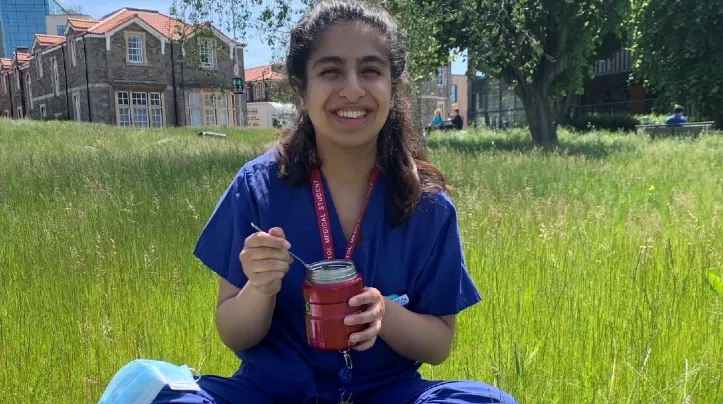
As part of our Mental Health Awareness Week activity, our local Young Leader Aashna opens up about the mental health impact of diabetes.
“Oh, so is your diabetes well controlled?” It’s a question I’ve heard more times than I can count - usually well-intentioned but it always catches me off-guard.
My issue with the word “control” is the implication that you have total say over your diabetes, which feels far from the truth given there’s at least 42 different factors that can affect blood glucose.
Growing up with type 1 diabetes, I knew that “good control” would prevent future complications, which is a key long-term goal for a young person’s diabetes care. The hardest thing for me has been accepting that even with the best effort, unexpected things can still happen. This is a constant work in progress.
As a medical student, I have often heard jokes or comments made at the expense of conditions like diabetes and when someone realises that I have diabetes, they automatically say - “but not you, you’re well controlled”. This is not only an assumption, but also makes it seem like this should stop you from intervening when uninformed comments are made.
In 2021 when I received a result from a routine eye screening, which told me that I had background retinopathy, I was unable to call my local eye screening information line until after the weekend. I spent the weekend feeling like no matter how hard I tried to manage my diabetes, there wasn’t any point. All I could think about was what I had done wrong for this to happen. It’s still something I never really shared with those around me, and I think I felt even more pressure as a medical student.
My friends at the University of Bristol Type 1 Diabetes Society and Together Type 1 reassured me until I could speak to my healthcare team. When I did speak to my healthcare team they explained that what had been picked up on my eye was common in someone who had diabetes as long as I had, and that it would likely go away, which it did. I realise now that the way I was feeling was a result of diabetes burnout; physical and emotional exhaustion due to the demands of living with and managing diabetes.
Some people with diabetes can really fall through the cracks; if someone seems like they’re hitting their targets then you might assume that they aren’t struggling with their mental health. Some people may even feel like they don’t deserve to access emotional support, knowing how much others require this too.
I’m so glad that people living with diabetes in my trust can self-refer to clinical psychology if needed. Having non-judgemental healthcare professionals can really make a difference, but it is also access to technology that reduces the risks of physical complications and the mental health burden of diabetes, which can be equally as dangerous. I hope that in the postcode lottery of healthcare, equitable access to both these things are prioritised.
Something my consultant once said really stuck with me: “We humans cannot expect ourselves to manage blood sugars the same way as a fully-functioning pancreas.”
This is what really helped me in the long-term - consistently practising being kind to myself and surrounding myself with understanding family and friends. Sometimes it takes someone else to remind you how much you do to manage your diabetes; juggling appointments, managing prescriptions, dealing with interrupted sleep, treating blood sugars and more. And all of this is often on top of a full-time job or education.
So, when people ask me how my “control” is, I just respond with “I try my best”, knowing that trying is in my control, and that I am learning to be kinder to myself encountering the bumps along the way.
Aashna is a Young Leader for the Together Type 1 programme. Through this role she supports other children and young people living with type 1 diabetes, to help them feel less isolated and alone. To find out more about the programme visit: www.diabetes.org.uk/youth-programme-hcp
